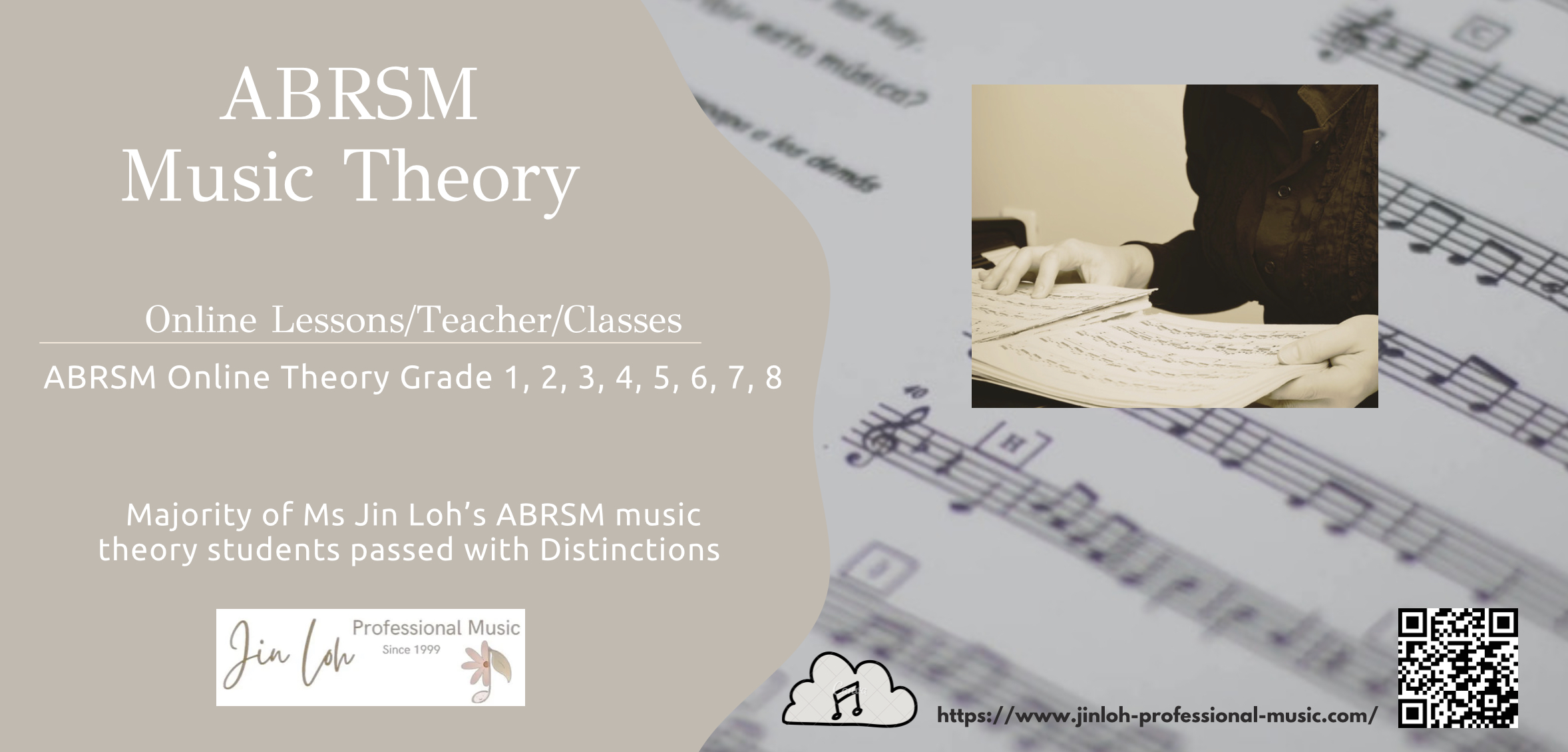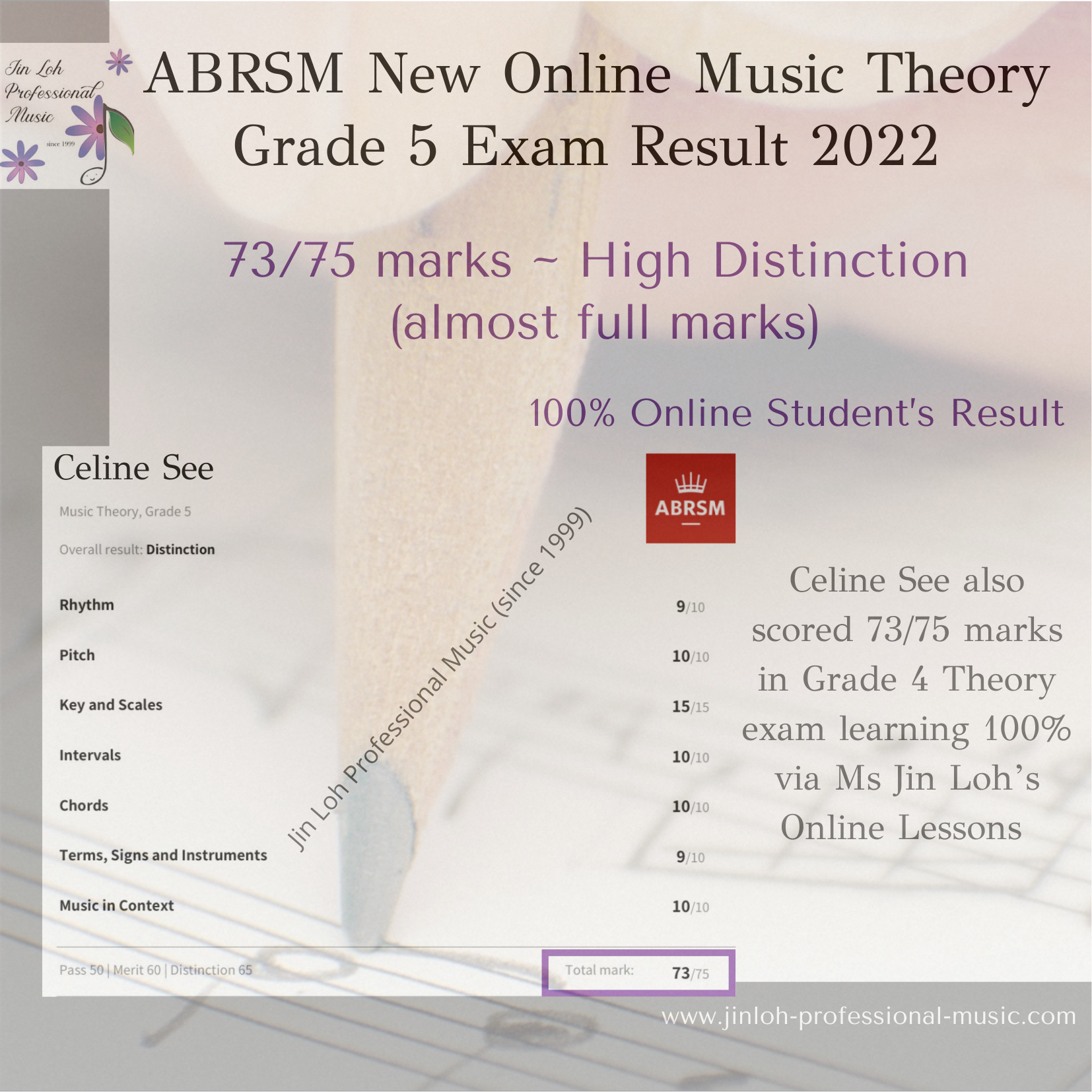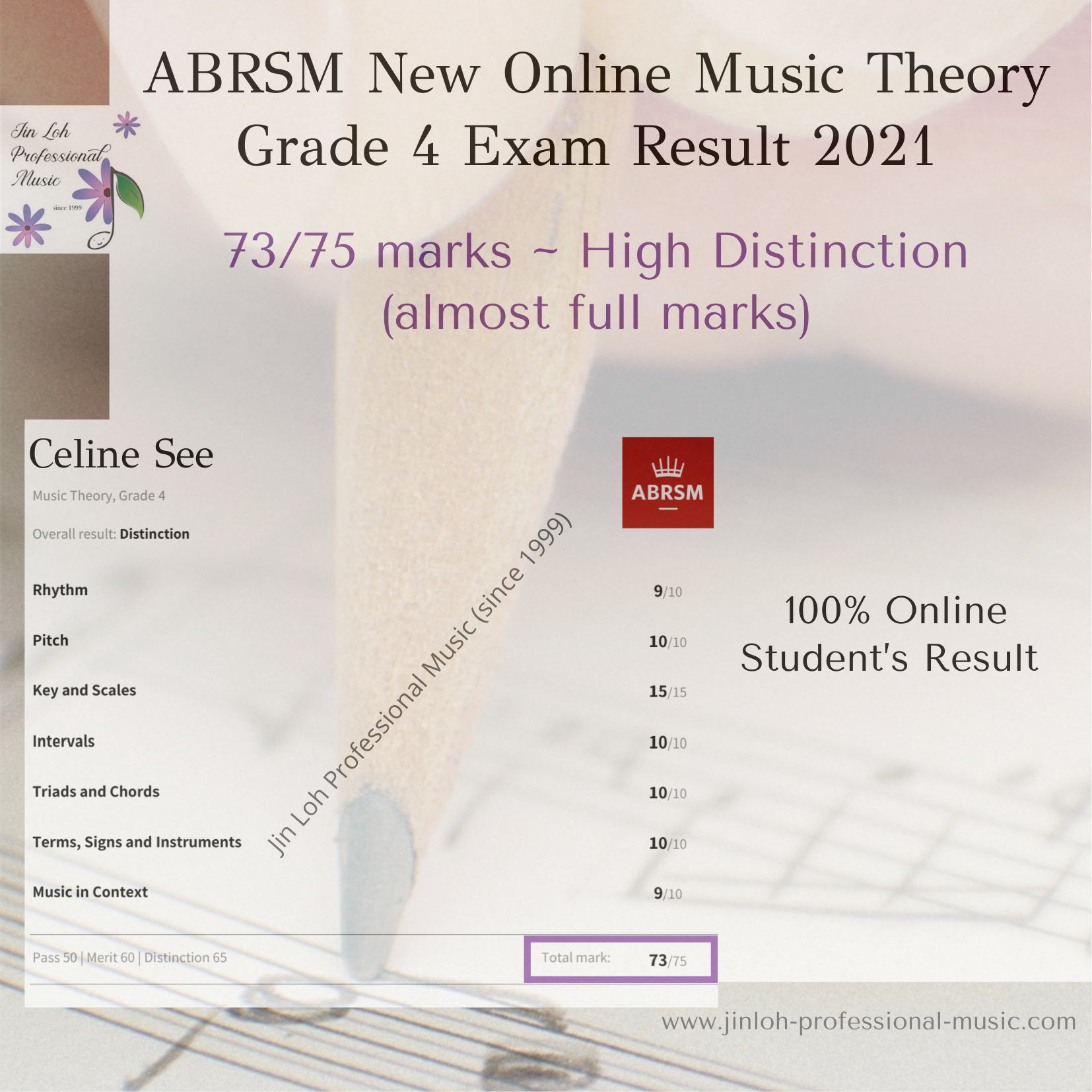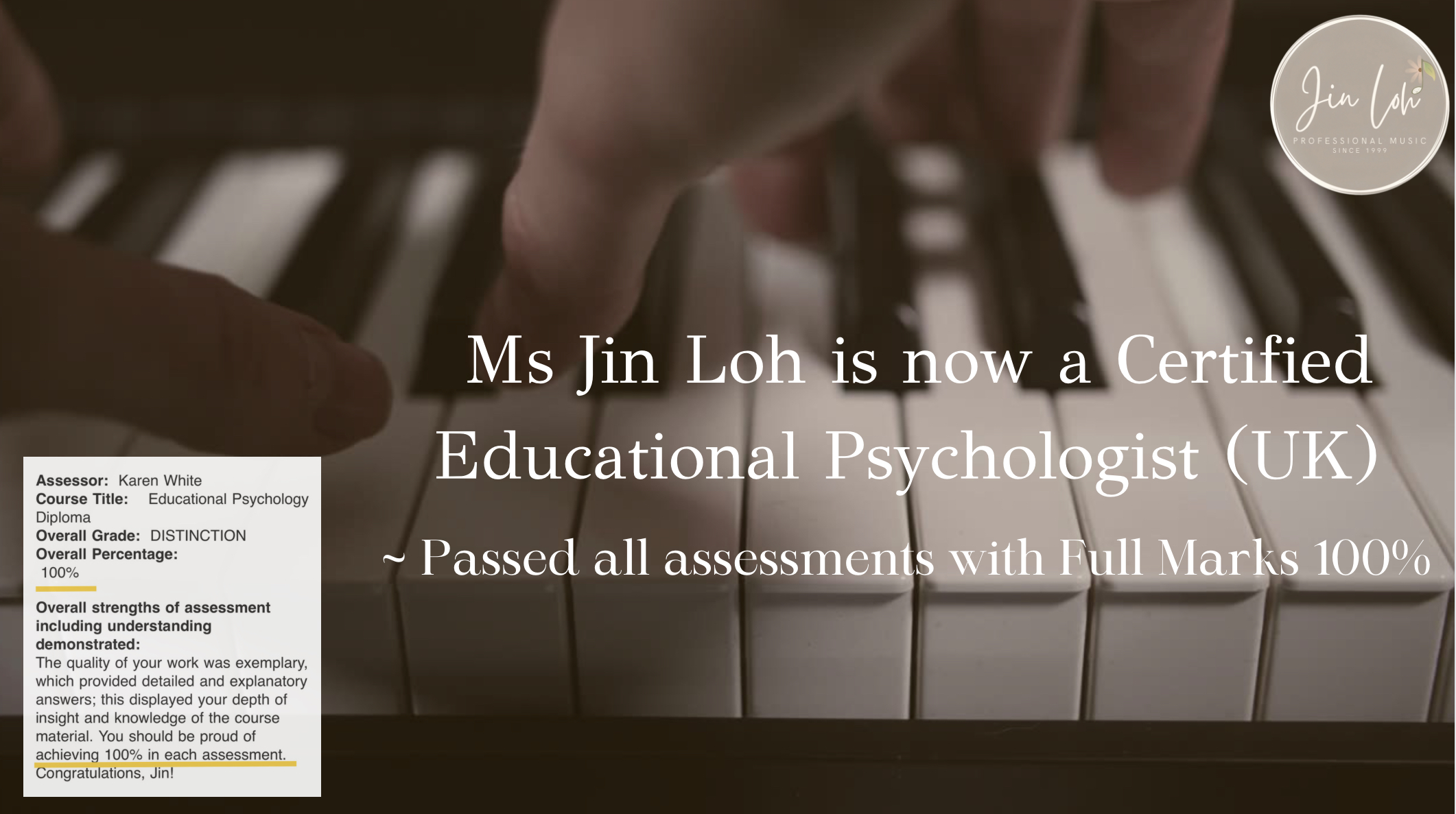
ABRSM Music Theory
Online Lessons/Class/Teacher
音楽理論オンラインレッスン

ABRSM music theory grade 1/2/3/4/5/6/7/8 lessons/classes/private tutor/teacher/online in Bangsar, Mon't Kiara, Sri Hartamas, Bandar Utama, Desa Sri Hartamas, Petaling Jaya (pj), Selangor, Damansara Heights, Taman Tun Dr. Ismail (ttdi), Perak, Damansara, Ampang, Kuala Lumpur (kl), Penang, Perlis, Pahang, Malacca (Melaka), Negeri Sembilan, Johor, Kedah, Kelantan, Terengganu, Sabah, Sarawak, Malaysia, Australia, New Zealand, Singapore, Thailand, Hong Kong, Japan, Korea and other countries.
Experienced ABRSM Theory Teacher
Music Qualifications
Ms Jin Loh holds a Bachelor Degree (Hons) in Professional Music (UK). She was accepted into the Dean's Lists for 5 semesters.
She plays 6 musical instruments: piano, flute, cello, singing, electon (electric organ) and guzheng (Chinese zither instrument), all 6 instruments till Teacher's Level.
Teaching Experiences
Ms Jin Loh is an international ABRSM music theory teacher with more than 22 years of teaching experiences.
ミス・ジンは日本語が話せるの音楽教師です。


Strong Track Records of Theory students
scoring Distinction
Exams results

Ms Jin Loh is a highly sought-after ABRSM music theory teacher by students from around the world thanks to her approachable, effective tutelage and her strong track records in teaching ABRSM music theory students who score outstanding Distinction results in their music theory exams.
Majority of Ms. Jin Loh's music theory students scored High Distinctions in grades 1-5 ABRSM music theory exams. For example, some theory student scored eg. almost full marks 99/100 marks; some grade 5 theory students scored 98/100 marks and most of her ABRSM Grade 6 theory students scored Distinctions..etc.
With the new ABRSM online digital theory exams, Ms Jin Loh's online theory students continue to score High Distinctions, almost full marks eg. 73/75 marks in e.g. ABRSM Grade 5 and Grade 4 Online Theory Exams.



Celine See is Ms Jin Loh's online theory student.
Under Ms Jin Loh's tutelage, Celine has been consistently scoring 73/75 marks (almost full marks) in both the ABRSM Online Theory Grade 5 and Grade 4 exams.

Ms Jin Loh's Students
Ms Jin Loh has trained many music teachers, musicians, professional adults (eg. businessmen, medical doctors, surgeons, lawyers, engineers, auditors, photographer, PhDs) and music college students. Ms Jin Loh's students include Tan Sri and Dato's children.
Ms Jin Loh's students are from for example: Australia, New Zealand, Singapore, United Kingdom (UK), France, Japan, Korea, Hong Kong and Malaysia.
All Rounder, Professional Music Theory Teacher
Ms Jin Loh is a trained professional musician. She received many years of formal trainings: playing and learning both Classical music and Jazz music theory/harmony.
Ms Jin Loh is one of the few abrsm music theory teachers with Educational Psychology (UK) and Sound Therapy (Sound Healing) (UK) certifications.

Certified Educational Psychologist (UK)
As a certified Educational Psychologist (UK) who passed all her Educational Psychology's assessments with full marks 100%, Ms Jin Loh incorporates her knowledge in e.g. human behaviours (Behaviorism); how students learn (Cognitivism); how to motivate students; and how to teach more effectively (Psychology of Teaching) in her music theory lessons.
Thus, Ms Jin Loh is regarded as an effective, approachable and good music theory teacher by her music theory students around the world.

Certified Sound Therapist
(Sound Healing) (UK)
As a certified Sound Therapist (Sound Healing) who also passed all her Sound Therapy (UK) assessments with full marks 100%, Ms Jin Loh also shares some of her sound healing knowledge with her music students.
Ms Jin Loh Combines ABRSM Music Theory Teachings with New Music Technology in Her Online Music Theory Lessons
Ms Jin Loh’s online music theory lessons are unique and effective.
Ms Jin Loh thinks that it is important for students to really hear the music excerpts/scores as printed on music theory books when students learn theory. If students could hear the sound demonstrated or played out, they may gain better understanding in their learning of music.
Instead of just teaching music theory e.g. by merely reading from theory books; or by analyzing the printed music scores "theoretically" on papers only, Ms Jin Loh put in extra effort to prepare music excerpts/scores to be "played out" by various musical instruments for her theory students to listen. This helps her theory students to gain better, deeper understanding and appreciate music even more.
Depending on the music excerpts/music scores’ instruments, Ms Jin Loh try to arrange music excerpts/scores to be played on specific instruments such as on harpsichord; piano; oboe; cello...etc, for her theory students to listen, after Ms Jin Loh's explanation/teachings.
For example, when Ms Jin Loh teaches her grade 6/7/8 theory students eg. What is Trio Sonata? What is Figured Bass? As Ms Jin Loh explains to her theory students, she uses the Harpsichord instrument to “play out’ the ABRSM Theory Book's Trio Sonata music excerpts for her students to listen.
During the Baroque period, J.S. Bach's keyboard compositions were written for keyboard instrument such as Harpsichord, not for the modern piano instrument. Therefore, it is better for students to listen to the music excerpts played by the authentic instrument - the harpsichord, instead of using another modern instrument such as piano to substitute, if possible.
Why Learn Music Theory?
To learn music, one needs to learn music theory. Music theory is the same for all musical instruments. Whether you would like to learn music theory for guitar, cello, violin, flute, singing, piano and other musical instruments.
Learning music theory helps music students to, for example, know how to read music notes and understand various music symbols meanings. Most importantly is to appreciate music even more.
Ms. Jin Loh has been teaching music for more than 22 years She teaches and prepares her music theory students to sit for the ABRSM (Associated Board of The Royal School of Music) theory exams from grade 1 till grade 8.
Music Theory Grade 1
♪ Students learn to read notes for example, C (Do), D (Re), E (Mi), F (Fa), G (Sol) in treble clef and bass clef.
♪ Study different types of basic music rhythm and their values. For example, minim (half note) worth 2 counts or equal 2 crotchet beats (quarter note).
♪ Learn what is major scale and its key signatures? For example, C Major, F Major (Bb), G Major (F#) and D major (F#, C#).
♪ Learn basic music symbols e.g. repeat signs.
♪ Italian music terms/words meanings for example, Allegro is quick.
Music Theory Grade 2
♪ Study other music rhythm and their values. For example, semiquaver (sixteenth note) worth 1/4 count.
♪ Learn to read higher and lower notes in treble clef and bass clef with 2 ledger lines.
♪ Learn what is minor scale and its key signatures? For example, D minor has Bb key signature.
♪ Learn to compose 4 bar rhythm.
Music Theory Grade 3
♪ Study smaller or faster music rhythm. For example, demisemiquaver (32nd note) worth 1/8 count.
♪ Learn intervals eg. how to know if an interval is major 3rd or minor 3rd.
♪ Learn how to group notes together, when to do beaming (when to connect notes tails together).
♪ Study simple phrase structure. How to identify music phrase or sentence in a music score.
Music Theory Grade 4
♪ Learn new clef: alto clef that is used by Viola player.
♪ Study about double sharps and double flats.
♪ Study music short forms and various music ornaments eg. trills, mordent.
♪ Introduction to orchestral music families e.g. Strings, Woodwind, Brass and Percussion families.
Music Theory Grade 5
♪ Students learn how to do transpositions in major 2nd, major 3rd higher or lower.
♪ How to name chords eg. chord I, chord IV.
♪ How to compose a 8 bars melody?
♪ Learn more about orchestral instruments their performance directions..etc
Music Theory Grade 6-Grade 8
♪ Students learn completely new topics in music. Very different from grades 1- 5 music theory topics.
♪ Students learn about figured bass, how to realise or write figured bass.
♪ Students learn to compose 16 bars melody with modulations (change to different key).
♪ Different musical periods in history and its music characteristics.
♪ Orchestrations.



